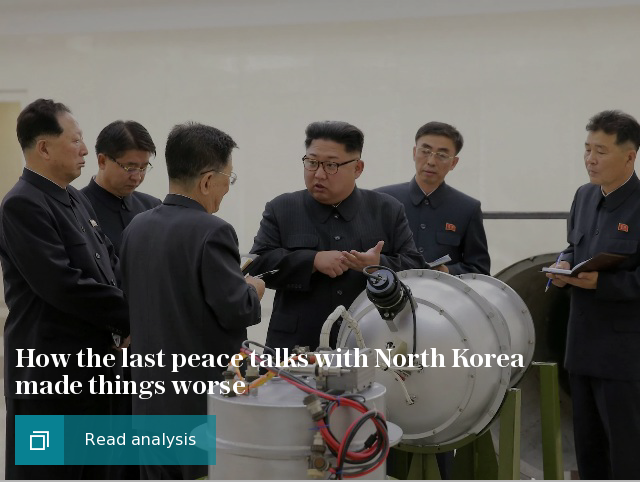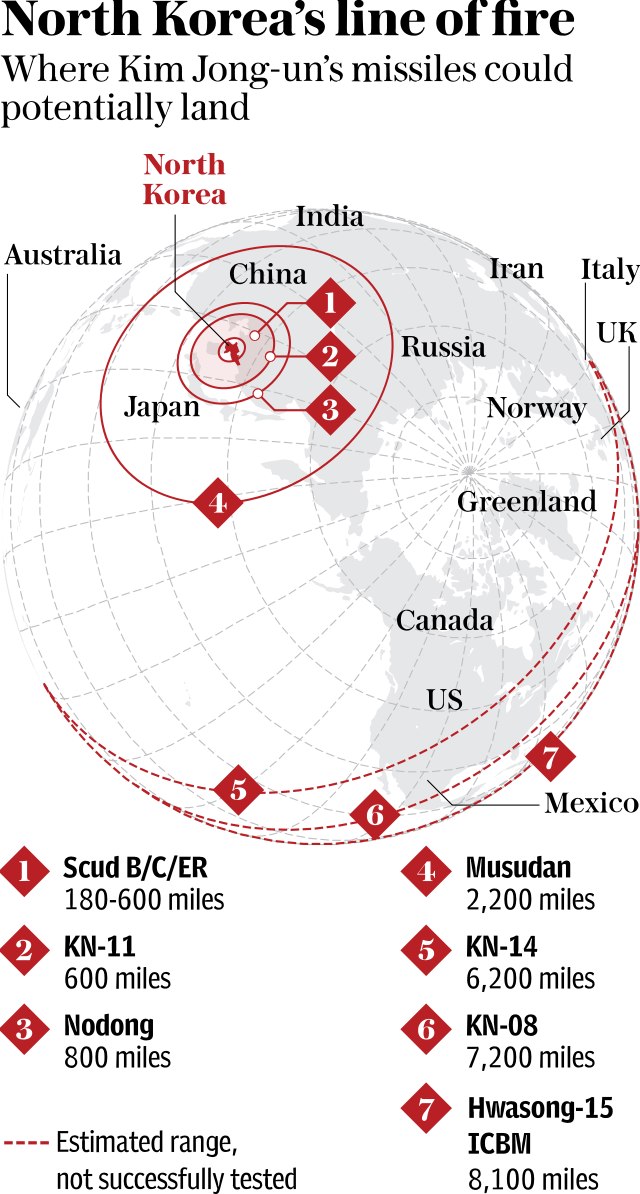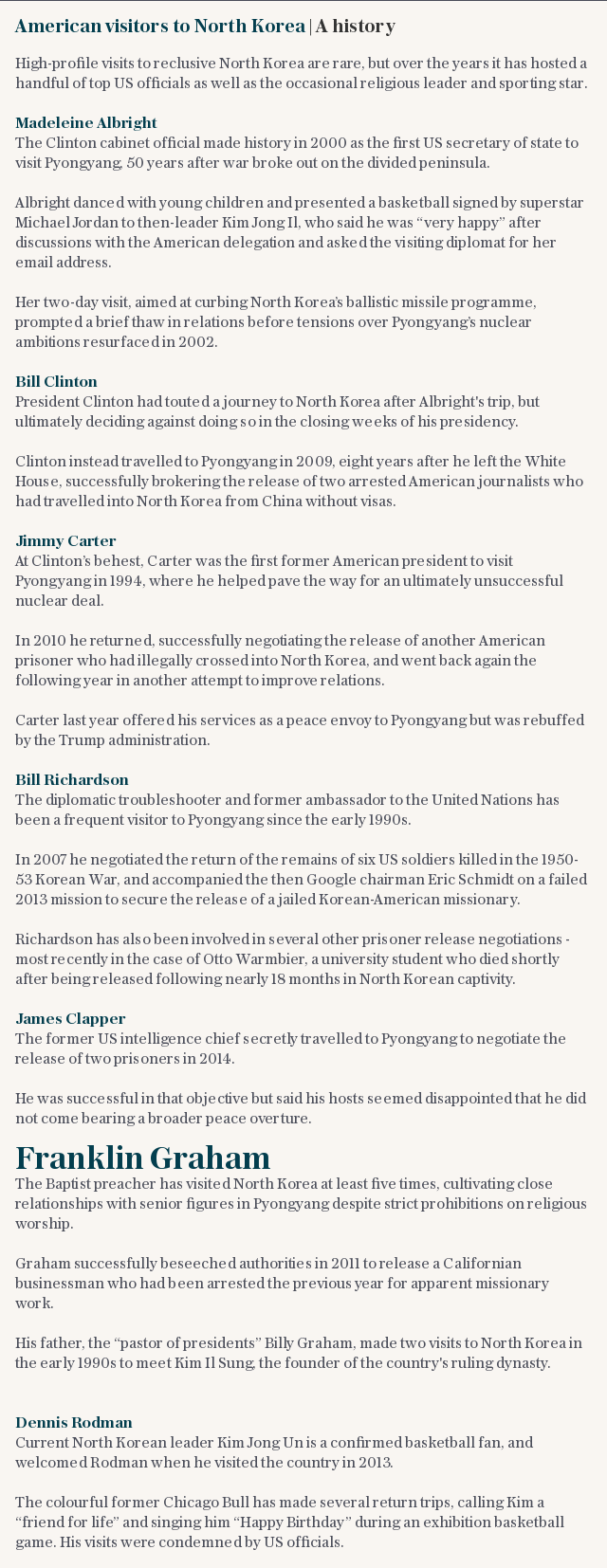Donald Trump reveals CIA chief Mike Pompeo formed 'good relationship' with Kim Jong-un on secret North Korea visit

CIA Director Mike Pompeo made a secret trip to North Korea over the Easter weekend to lay the groundwork for an unprecedented upcoming summit between Kim Jong-un and US President Donald Trump.
The unexpected and clandestine meeting is believed to have taken place on April 1, the same day Mr Kim was also welcoming a delegation of K-pop stars to the North Korean capital, Pyongyang.
Mr Trump confirmed the secret visit to Pyongyang in a tweet on Wednesday, saying: "Meeting went very smoothly and a good relationship was formed. Details of Summit are being worked out now.
"Denuclearization will be a great thing for World, but also for North Korea!"
The revelation, broken by the Washington Post, that the Secretary of State nominee met with the reclusive North Korean leader is the strongest confirmation to date that the historic face to face meeting of the two leaders will go ahead, possibly in late May or early June.

Very little is known about Mr Pompeo’s discussions, although a major practical sticking point remains the question of where the summit will be held.
Multiple locations have been touted, including the borderzone between South and North Korea, Singapore, Geneva, Stockholm and Mongolian capital, Ulaanbaatar.
The North Koreans are said to prefer a location closer to home, while the Americans would rather avoid creating the perception of President Trump going cap in hand to Mr Kim on his home turf in Pyongyang.
Mr Pompeo’s visit is the highest level US meeting with a North Korean leader since then-Secretary of State Madeleine Albright met with Kim Jong-il in 2000.
Mike Pompeo met with Kim Jong Un in North Korea last week. Meeting went very smoothly and a good relationship was formed. Details of Summit are being worked out now. Denuclearization will be a great thing for World, but also for North Korea!
— Donald J. Trump (@realDonaldTrump) April 18, 2018
The CIA director did not take any White House officials with him on the trip, only intelligence officials, reported CNN. An official source told the news channel that the North Korean leader was “personable and well prepared.”
The conversation fueled Mr Trump’s belief that productive negotiations were possible with the North Koreans, but far from guaranteed, according to an official briefed on the trip, who spoke on condition of anonymity.
Mr Trump had alluded to the meeting on Tuesday, revealing that the United States was engaged in direct talks with North Korea at "extremely high levels", during a meeting with Japanese Prime Minister Shinzo Abe at his Florida resort of Mar-a-Lago.
“I truly believe there is a lot of good will. A lot of things are happening. Good things are happening,” he said. “We’ll see what happens because it’s the end result that counts, not the fact that we’re thinking about having a meeting.”

Mr Trump added that five possible venues were being discussed, but also threw in the caveat that the extraordinary plan may not happen at all.
“It’s possible things won’t go well and we won’t have the meetings, and we’ll just continue to go along this very strong path that we’ve taken,” the president said. “But we’ll see what happens.”
The planned US-North Korea summit will be preceded by another historic meeting between Kim Jong-un and South Korean President Moon Jae-in on the highly militarised border between the two nations next Friday.
Their talks will set the tone for possible concessions on all sides over the denuclearisation of the Korean Peninsula. The neighbouring countries are also said to be discussing plans to announce an official end to their 68-year-old military conflict.
The two nations are still technically at war as a peace treaty was never signed to replace the armistice that ended the 1950-1953 Korean War.

President Trump on Tuesday gave his “blessing” to those discussions. “People don’t realise the Korean War has not ended. It’s going on right now…Subject to a deal, they have my blessing,” he said.
Frantic planning is still underway for next week’s summit. South Korea’s presidential office said on Wednesday that North and South Korea had agreed to broadcast parts of it live.
Kim Jong-un may have a busy schedule over the coming months as he experiences a rapid transition from being an international pariah last year during a barrage of missile tests, to now becoming one of the most sought after leaders in the world.
CNN reported that Chinese President Xi Jinping also plans to visit Pyongyang soon. Russia has reportedly also requested a personal summit with Mr Kim, although the North Koreans have not yet responded.
The breakneck speed of international diplomacy this year has raised hopes that a peaceful solution can be found to tensions over Pyongyang’s nuclear and weapons programme, but not all are optimistic.

Thae Yong-ho, the most senior North Korean diplomat to ever defect warned that Pyongyang will drag out discussions with South Korea and the United States - possibly for as long as three years - in order to extract the maximum concessions.
Mr Thae, who served as the deputy chief of mission at the North Korean embassy in London before fleeing with his family in 2016, said Kim Jong-un will retain his nuclear arsenal during that time and wait for President Trump "to be replaced" with a leader less likely to resort to force.
"Kim will act during his summits with Seoul and Washington as if he is determined to dismantle his nuclear weapons in stages - first declaring dismantlement, followed by incapacitating the nuclear weapons and then denuclearisation", he told the Mulmangcho Foundation in Seoul, The Korea Times reported.

At each stage, he will demand - and probably be granted - concessions, Mr Thae said.
Ultimately, however, North Korea "can never abandon its nuclear weapons because it proclaims itself a nuclear state in its constitution", he said.
Mr Thae said harsh economic sanctions on North Korea had forced Mr Kim to the negotiating table and he called on President Moon to also demand improvements in the North's human rights record in return for concessions.


